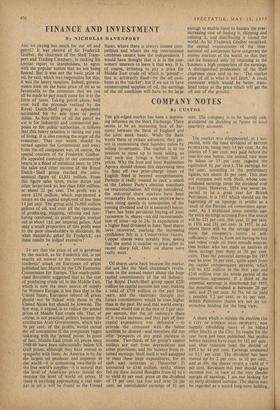FINANCE AND INVESTMENT
Ry NICHOLAS DAVENPORT ARE we paying too much for our oil and petrol? It was shreivd of Sir Frederick Godber, the chairman of the Shell Trans- port and Trading Company, in making his annual report to shareholders, to agree with the popular notion that we are being fleeced. But it was not the basic price of oil, he said, which was responsible for this; it was the heavy taxation. Indeed, govern- ments look on the basic price of oil as so favourable to the consumer that we can all be made to pay much more for it in the form of taxes. Taking petrol alone, well over half the proceeds realised by the Royal Dutch-Shell group is apparently accounted for by sale taxes or petrol duties. As four-fifths of all the petrol we use is for industrial and commercial pur- poses or for public authorities, it follows that this heavy taxation is raising our cost of living. It is also rousing the anger of the consumer. That our wrath should be turned against the Government and away from the oil companies was, of course, the special concern of Sir Frederick Godber. He appealed cunningly to our commercial hearts in a flood of statistical tears. In 1954 the sales and other income of the Royal Dutch - Shell group reached the astro- nomical figure of £1,851 million. From this figure sales taxes, excise duties and other levies took no less than £406 million, or about 22 per cent. The profit was a mere £134 million, which represented a return on the capital employed of less than 14 per cent. The group sold 26,000 million gallons of oil, and over all the operations of producing, shipping, refining and mar- keting combiried, its profit margin worked out at about 14d. per imperial gallon. And only a small proportion of this profit went to the poor shareholders in dividends. By what standards, asked Sir Frederick, can these results be judged excessive?
* * States, where there is always intense com- petition and where the big international combines cannot boss the independents. I would have thought that it is in the con- sumers' interests to leave it that way. It is, of course, irritating to pay a price for Middle East crude oil which is 'posted'— that is, arbitrarily fixed--by the oil com- bines as the 'market'; but if we are to have uninterrupted supplies of oil, the earnings of the oil combines will have to be large enough to enable them to finance the ever- increasing cost of finding it, shipping and refining it, and distributing it round the world. As Sir Frederick Godber remarked, the capital requirements of the inter- national oil companies have outgrown the money markets of the world, so that they can be financed only by retaining in the business a high proportion of the earnings. A distinguished predecessor of the Shell chairman once said to me : 'The market price of oil is what it will fetch.' A crude statement which would be better trans- lated today as the price which will get the oil out of the ground.


































 Previous page
Previous page